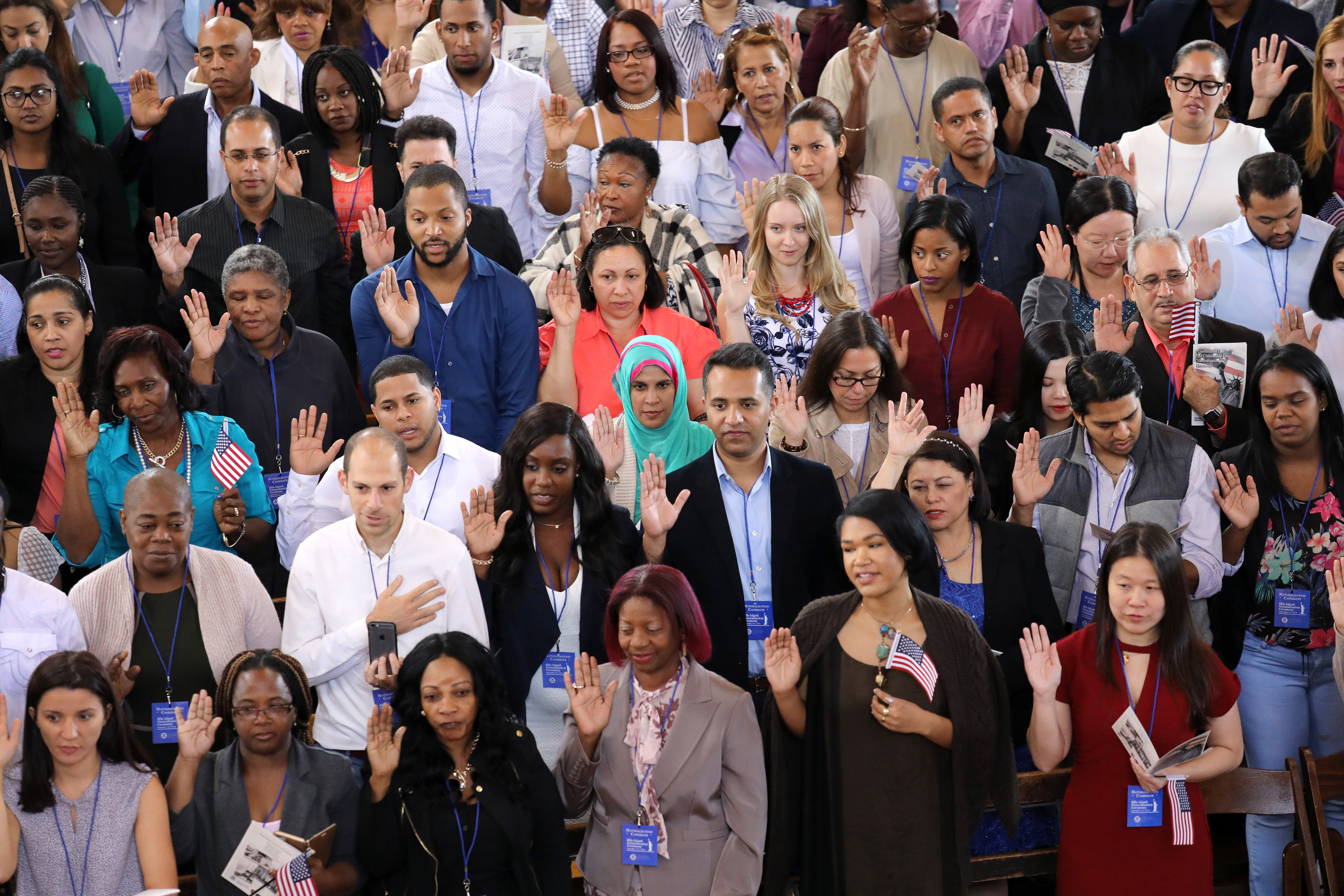Ending DACA could royally screw up the Census. That's a problem for the GOP.
The process of assigning seats in the House is determined directly by population. What happens if 800,000 immigrants are afraid to be counted?


In 2012, the White House, under President Obama, urged undocumented immigrants who came to the United States as minors to declare their presence. In exchange for coming forward and being counted — which is legally, economically, and ethically preferable to maintaining a status quo in which immigrants live in the shadows of society — these people were promised that they would be spared the full weight of the deportation process. As such, many chose to hand over their details.
Now, a different president is poised to use that same information those 800,000 immigrants provided against them and their families to facilitate deportation. The Trump administration's reversal of the Deferred Action for Childhood Arrivals (DACA) policy means that immigrants who came forward under DACA were effectively lured into a trap.
This is the worst kind of public policy. It incentivizes exactly the wrong behavior. People who remained hidden from official view are no more at risk today than they were in the past, but immigrants who were circumspect in attempting to follow the rules are now exposed to the risk of deportation. The result will not be fewer immigrants in the country, but merely more immigrants attempting to remain out of sight.
The Week
Escape your echo chamber. Get the facts behind the news, plus analysis from multiple perspectives.

Sign up for The Week's Free Newsletters
From our morning news briefing to a weekly Good News Newsletter, get the best of The Week delivered directly to your inbox.
From our morning news briefing to a weekly Good News Newsletter, get the best of The Week delivered directly to your inbox.
We will not feel the full consequences of rolling back DACA until 2020. In addition to an already anticipated presidential race, that year will include another critically important event: the U.S. Census. Crucially, the U.S. Census is a strict population count; it is not a count of citizens. The Census Bureau makes its best effort to count, as the law mandates, everyone in a given area using a combination of methods, which in 2020 will include mail-in forms, online responses, and traditional door-to-door counts. This is not new; all censuses past, present, and future reflect a combined count of citizens, documented non-citizens, and undocumented immigrants.
If immigrants — properly documented or otherwise — were not already leery of interacting with the government before the DACA reversal, they are now. What rational person would roll the dice on responding to a Census form under the current administration? Is it far-fetched to imagine that information ending up in the hands of law enforcement? If not likely, it is certainly plausible.
That the Census struggles to produce an accurate, representative count of the African-American, Latino, and Asian-American population is well documented in research. The percentage of these communities missed in the Census is disproportionately high compared to white non-Hispanics. The problem of undercounting Latinos in particular is not new. Now it will get worse with the twin chilling effects of increased Immigration and Customs Enforcement (ICE) crackdowns and the DACA reversal.
So what? Why does it matter? Because the Census is vitally important politically and economically. The process of reapportioning seats in the House is determined directly by population, and the method used to calculate it is sensitive to small changes in state populations. Suppressed counts in states with large Latino populations could influence where the last few marginal seats are awarded. Additionally, the Census is used to determine, in part, the amount of federal funding received at the local level, meaning that undercounts will hit areas that are already struggling especially hard.
A free daily email with the biggest news stories of the day – and the best features from TheWeek.com
Ironically, President Trump's actions may come full circle for the Republican Party when the Census is completed. Enormous Latino populations in states like Texas, Arizona, and Florida include many non-citizens, and undercounting them could negate some of the gains these fast-growing states might otherwise receive from the next round of reapportionment. If so, the GOP will have to decide whether its anti-immigration orientation is winning it enough votes among white non-Hispanics to outpace the damage it causes in minority communities. Given our country's rapidly changing demographics, they may not like the answer.
It is possible, given the president's multiple, confused, and contradictory statements about DACA on Tuesday, that deportation of "DREAMers" will not happen in six months, if ever. However, the damage of this reversal cannot be undone by reverting to the status quo in the future. The trust that has been violated with this decision, even across different presidencies, will not be forgotten quickly among immigrant communities, their families, and their allies. Anyone inclined to question what exactly the government will do with information it obtains about non-citizens now has all the evidence needed to justify paranoia.
Conducting an accurate Census is difficult under the best circumstances; in the shortsighted fashion that is becoming all too typical of its decision-making process, the Trump administration has just made the task more difficult by an order of magnitude. Immigrants and communities with large proportions of Hispanic residents are likely to suffer, but proof that the universe has a sense of humor lies in the potential for this mean, pointless policy reversal to come back to haunt the GOP in a few short years.
Ed Burmila is an Assistant Professor of Political Science at Bradley University. He lives in Chicago and blogs politics at Gin and Tacos.
-
 Will SpaceX, OpenAI and Anthropic make 2026 the year of mega tech listings?
Will SpaceX, OpenAI and Anthropic make 2026 the year of mega tech listings?In Depth SpaceX float may come as soon as this year, and would be the largest IPO in history
-
 Reforming the House of Lords
Reforming the House of LordsThe Explainer Keir Starmer’s government regards reform of the House of Lords as ‘long overdue and essential’
-
 Sudoku: February 2026
Sudoku: February 2026Puzzles The daily medium sudoku puzzle from The Week
-
 The billionaires’ wealth tax: a catastrophe for California?
The billionaires’ wealth tax: a catastrophe for California?Talking Point Peter Thiel and Larry Page preparing to change state residency
-
 Bari Weiss’ ‘60 Minutes’ scandal is about more than one report
Bari Weiss’ ‘60 Minutes’ scandal is about more than one reportIN THE SPOTLIGHT By blocking an approved segment on a controversial prison holding US deportees in El Salvador, the editor-in-chief of CBS News has become the main story
-
 Has Zohran Mamdani shown the Democrats how to win again?
Has Zohran Mamdani shown the Democrats how to win again?Today’s Big Question New York City mayoral election touted as victory for left-wing populists but moderate centrist wins elsewhere present more complex path for Democratic Party
-
 Millions turn out for anti-Trump ‘No Kings’ rallies
Millions turn out for anti-Trump ‘No Kings’ ralliesSpeed Read An estimated 7 million people participated, 2 million more than at the first ‘No Kings’ protest in June
-
 Ghislaine Maxwell: angling for a Trump pardon
Ghislaine Maxwell: angling for a Trump pardonTalking Point Convicted sex trafficker's testimony could shed new light on president's links to Jeffrey Epstein
-
 The last words and final moments of 40 presidents
The last words and final moments of 40 presidentsThe Explainer Some are eloquent quotes worthy of the holders of the highest office in the nation, and others... aren't
-
 The JFK files: the truth at last?
The JFK files: the truth at last?In The Spotlight More than 64,000 previously classified documents relating the 1963 assassination of John F. Kennedy have been released by the Trump administration
-
 'Seriously, not literally': how should the world take Donald Trump?
'Seriously, not literally': how should the world take Donald Trump?Today's big question White House rhetoric and reality look likely to become increasingly blurred
